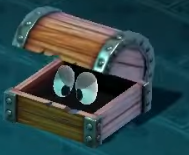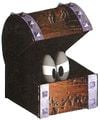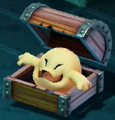Huhwhat: Difference between revisions
LinkTheLefty (talk | contribs) (For all we know, it was the Dutch translator who came up with Huhwat, and the English one borrowed from it.) |
|||
| Line 46: | Line 46: | ||
|KorM=Childish pronunciation of "뭐지" (''mwoji'', a Korean phrase that roughly means "what?") | |KorM=Childish pronunciation of "뭐지" (''mwoji'', a Korean phrase that roughly means "what?") | ||
|Spa=Chascón | |Spa=Chascón | ||
|SpaM=Portmanteau of ''chasco'' ("disappointment") | |SpaM=Portmanteau of ''chasco'' ("disappointment") with the augmentative suffix ''-ón'' and also ''arcón'' ("chest"). | ||
}} | }} | ||
{{SMRPG}} | {{SMRPG}} | ||
Revision as of 12:17, August 10, 2024
| Huhwhat | |||
|---|---|---|---|
 Artwork from Super Mario RPG (Nintendo Switch) | |||
| First appearance | Super Mario RPG: Legend of the Seven Stars (1996) | ||
| Latest appearance | Super Mario RPG (Nintendo Switch) (2023) | ||
| |||
A Huhwhat (originally known as a Pandorite) is an enemy disguised as a treasure box that appears in Super Mario RPG: Legend of the Seven Stars and its remake. The creature inside the chest appears to be either a squat, pudgy ghost or a mole of some sort. It is encountered in the Kero Sewers. Its original name comes from the name of the Greek legend of Pandora's box, a container that released the world's misfortunes when opened. In the remake, its new name of Huhwhat is a combination of the interjections "huh" and "what," while also staying true to its Japanese name.
A Huhwhat possesses both high physical attack and defense, and equally high magical attack and defense. It is immune to all special attacks, Mario's various jump attacks excepted. In battle, a Huhwhat can cast various fire spells, including Flame and Flame Wall. The creature inside the chest also uses the attack Scream, which can induce the Fear status ailment and Carni-Kiss, as well as physical strikes. Defeating Huhwhat rewards Mario's party with ten Experience Points, 30 coins, a Flower Jar, and the Trueform Pin. If Mario exits the room and reenters it at any point, the treasure box that previously held the Huhwhat then contains an additional 50 coins instead.
Several monsters similar to a Huhwhat also appear in the game, those being a Whuhoh, Pleaseno, and Comeon.
Profiles and statistics
Super Mario RPG: Legend of the Seven Stars
| Super Mario RPG: Legend of the Seven Stars enemy | |||||||||
|---|---|---|---|---|---|---|---|---|---|
| Pandorite | |||||||||
| HP | 300 | FP | 50 | Speed | 1 | ||||
| Location(s) | Kero Sewers | Attack | 30 | Magic attack | 20 | ||||
| Role | Common | Defense | 20 | Magic defense | 20 | ||||
| Bonus Flower | None | Yoshi Cookie | None | Morph rate | 0% | ||||
| Evade | 0% | Magic evade | 0% | Spells | Flame Wall, Flame | ||||
| Weak | Jump | Strong | Fire, Thunder, Ice, Fear, Poison, Sleep, Mute, Critical | Sp. attacks | Carni-Kiss, Scream | ||||
| Coins | 30 | Exp. points | 20 | Items | Flower Jar (25%), Flower Jar (5%) | ||||
| Psychopath | "I'm trying to sleep, OK?" | ||||||||
Super Mario RPG (Nintendo Switch)
| Super Mario RPG enemy | |||||||||
|---|---|---|---|---|---|---|---|---|---|
| Huhwhat | |||||||||

|
HP | 300 | Weak Elements | Drops | Flower Jar | ||||
| Exp. | 20 | Weak Statuses | N/A | Rare Drops | N/A | ||||
| Found in | Kero Sewers | ||||||||
| Monster List profile | Anxious about what might be in the box? You should be—it's a Huhwhat! They're usually watching you. | ||||||||
| Thought Peek | "*grumble* Way to bother a person when they're sleeping." | ||||||||
| Animations | |||||||||
Gallery
Names in other languages
| Language | Name | Meaning | Notes |
|---|---|---|---|
| Chinese (simplified) | 谜达罗[?] Mídáluó |
From「谜」(mí, "enigma") and the part of Japanese name | |
| Chinese (traditional) | 謎達羅[?] Mídáluó |
From「謎」(mí, "enigma") and the part of Japanese name | |
| Dutch | Huhwat[?] | Portmanteau of "huh" and wat ("what"); direct parallel to the English name | |
| French | Cocoffrelin[?] | From coffre ("chest") with the diminutive suffix -lin | |
| German | Tricktruhe[?] | Trick Chest | |
| Italian | Scrignolo buh[?] | Li'l chest boo; from scrigno ("treasure chest") and the diminutive suffix -olo | |
| Korean | 머지[?] Meoji |
Childish pronunciation of "뭐지" (mwoji, a Korean phrase that roughly means "what?") | |
| Spanish | Chascón[?] | Portmanteau of chasco ("disappointment") with the augmentative suffix -ón and also arcón ("chest"). |

